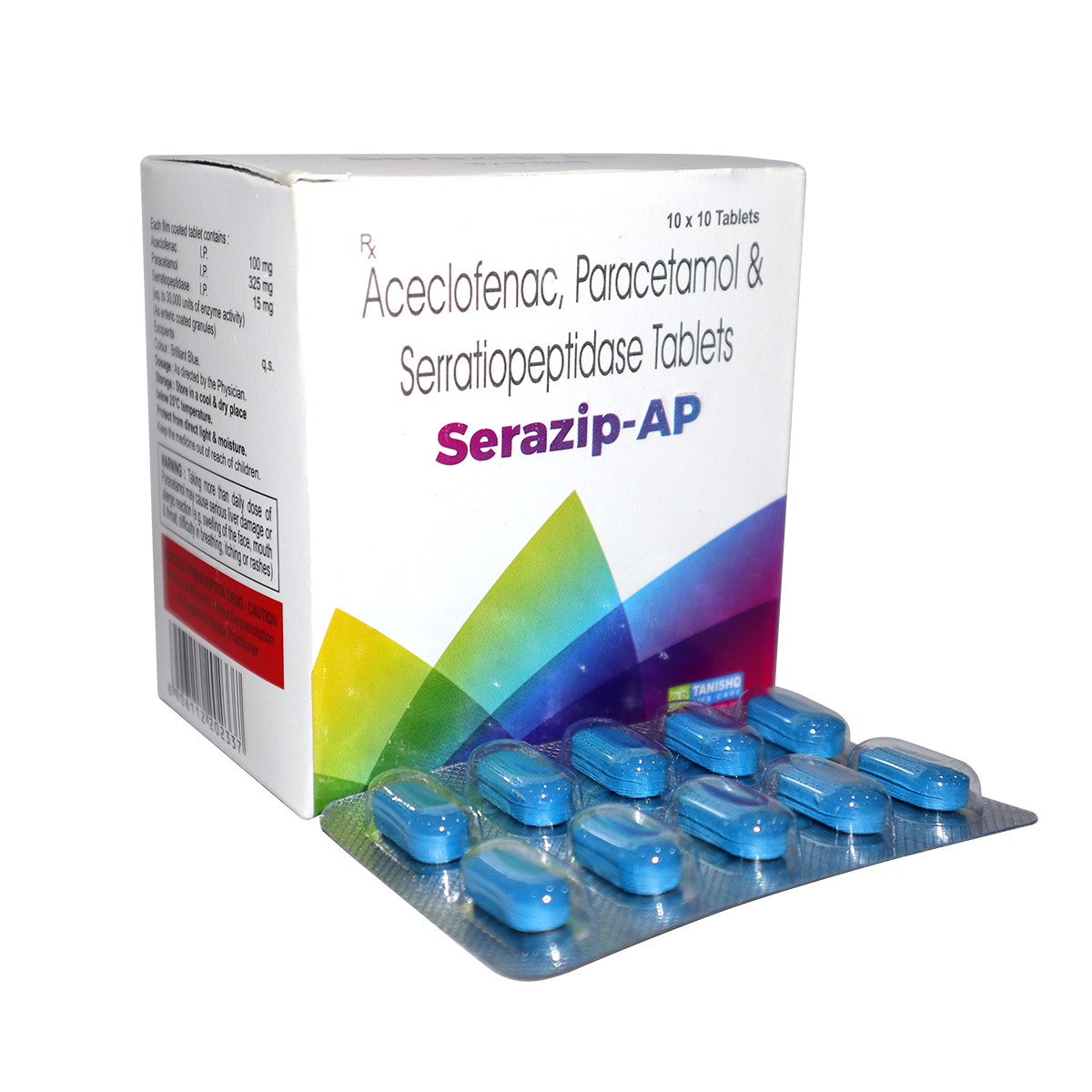
Serazip-AP
This combination tablet contains Serratiopeptidase, Aceclofenac, and Paracetamol, which work together to provide relief from pain and inflammation, while also helping with swelling and tissue healing.
- Serratiopeptidase: An enzyme that helps reduce inflammation and promote tissue healing. It works by breaking down dead or damaged tissue, which reduces swelling and pain.
- Aceclofenac: A nonsteroidal anti-inflammatory drug (NSAID) that provides pain relief and reduces inflammation by inhibiting the COX-2 enzyme involved in producing prostaglandins, which contribute to pain and swelling.
- Paracetamol (Acetaminophen): A pain reliever and fever reducer that works by inhibiting the production of prostaglandins in the brain, thus providing pain relief and reducing fever.
- Recommended Usage
Indications
This combination tablet is commonly prescribed for:
Acute pain relief from conditions such as:
o Back pain, muscle pain, joint pain
o Arthritis (osteoarthritis, rheumatoid arthritis)
o Post-surgical pain and injury-related pain
o Dysmenorrhea (painful menstruation)
Swelling and inflammation associated with musculoskeletal conditions.
Fever: Reduction of fever in conditions such as flu, cold, or infections.
Dosage and Administration
Typical Dosage: The usual recommended dose is 1 tablet taken twice daily (morning and evening), preferably after meals.
o Take the tablet with a full glass of water to help prevent stomach irritation.
o Follow your healthcare provider’s instructions carefully regarding the dosage.
Maximum Dosage: Do not exceed the prescribed dose of 2 tablets per day (200 mg Aceclofenac, 650 mg Paracetamol, 30 mg Serratiopeptidase) unless instructed by your healthcare provider.
Duration: This medication is typically used for short-term pain and inflammation relief (e.g., 5-7 days), especially in acute conditions. Long-term use should be avoided unless specifically recommended by a doctor.
Precautions
Liver and Kidney Function: Both Paracetamol and Aceclofenac can affect liver and kidney function. It is important to avoid excessive use of these medications, particularly in individuals with pre-existing liver or kidney problems.
o Paracetamol: Overuse can cause severe liver damage, especially in those with existing liver conditions.
o Aceclofenac: Prolonged use of NSAIDs like Aceclofenac can increase the risk of kidney issues, particularly in individuals with pre-existing kidney disease.
Gastrointestinal Risk: NSAIDs (like Aceclofenac) can cause stomach irritation, ulcers, or gastrointestinal bleeding. Use with caution in individuals with a history of stomach ulcers, gastrointestinal bleeding, or other gastrointestinal disorders.
Allergic Reactions: Serratiopeptidase may cause allergic reactions in sensitive individuals. If you experience symptoms like rash, itching, or swelling, discontinue use and consult a doctor.
Cardiovascular Risk: Prolonged use of Aceclofenac may increase the risk of heart attack or stroke, especially in individuals with cardiovascular disease or high blood pressure.
Pregnancy and Breastfeeding:
o Aceclofenac and Serratiopeptidase should be avoided during the third trimester of pregnancy, and only used in the first two trimesters if prescribed by a doctor.
o Paracetamol is generally considered safe during pregnancy, but use should be minimized.
o Breastfeeding: Consult a doctor before using this combination while breastfeeding.
Elderly Patients: Elderly individuals may be more prone to side effects such as gastrointestinal bleeding, kidney damage, or heart-related issues from prolonged use of NSAIDs like Aceclofenac.
Product Category
- Anti Infective
- Injectables
- Pre Filled Syringe
- Immunosuppressants
- Anti Ulcerant/ppis
- Joint Care
- Enzymes
- Heamatinic Agents
- Antioxidant Multivitamins
- Laxatives
- Anti Alergic
- Corticosteroids & Combinations
- Anti Fungal
- Medicated Soaps
- Emollients and Moisturisers
- Face Care
- Puva & Sun Protectors
- Hair Care
- Anti Acne Preparation
- Analgesics Antipyretics & Anti Inflammatory
- Anti Spasmodic & Anti Emetic
- Expectorants Antitussives & Mucolytics
- Antidiarrheals
- Cardiac Drugs
- Antipsychotics
- Anti Epileptics
- Migraine
- Anti Dyspetic
